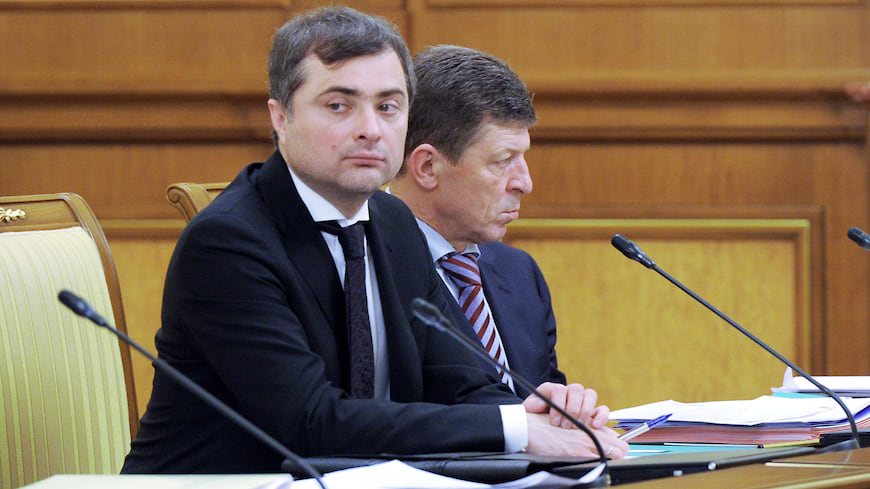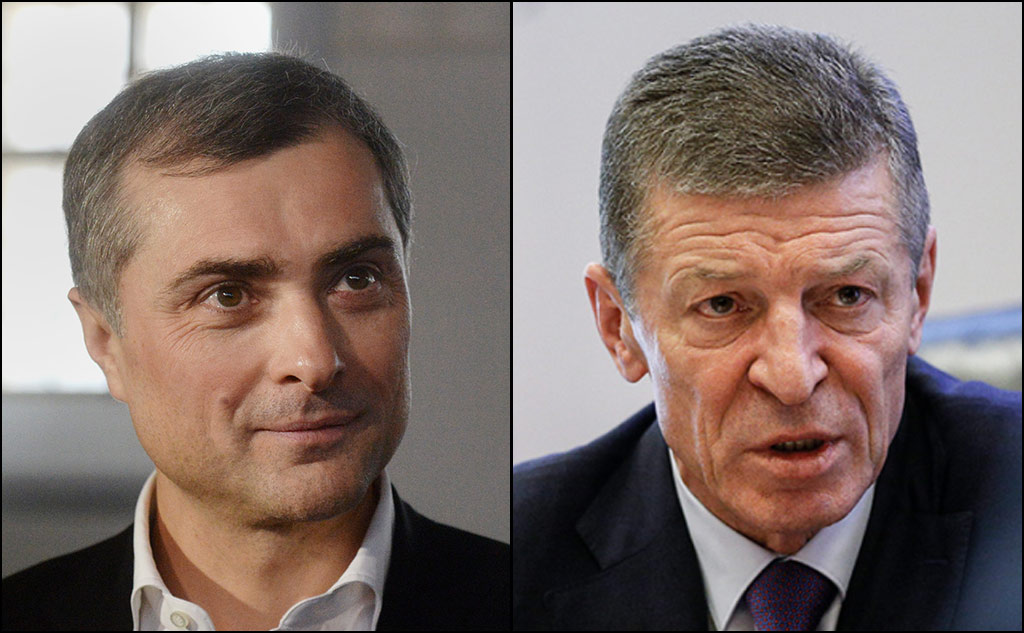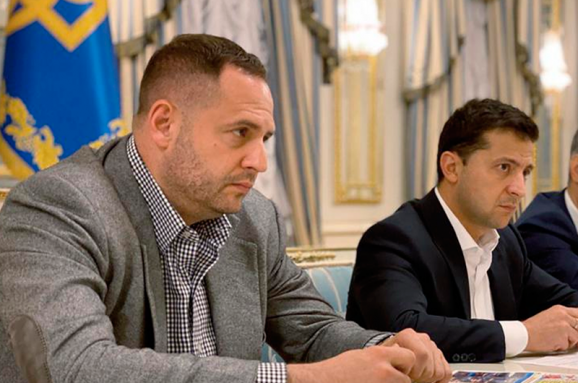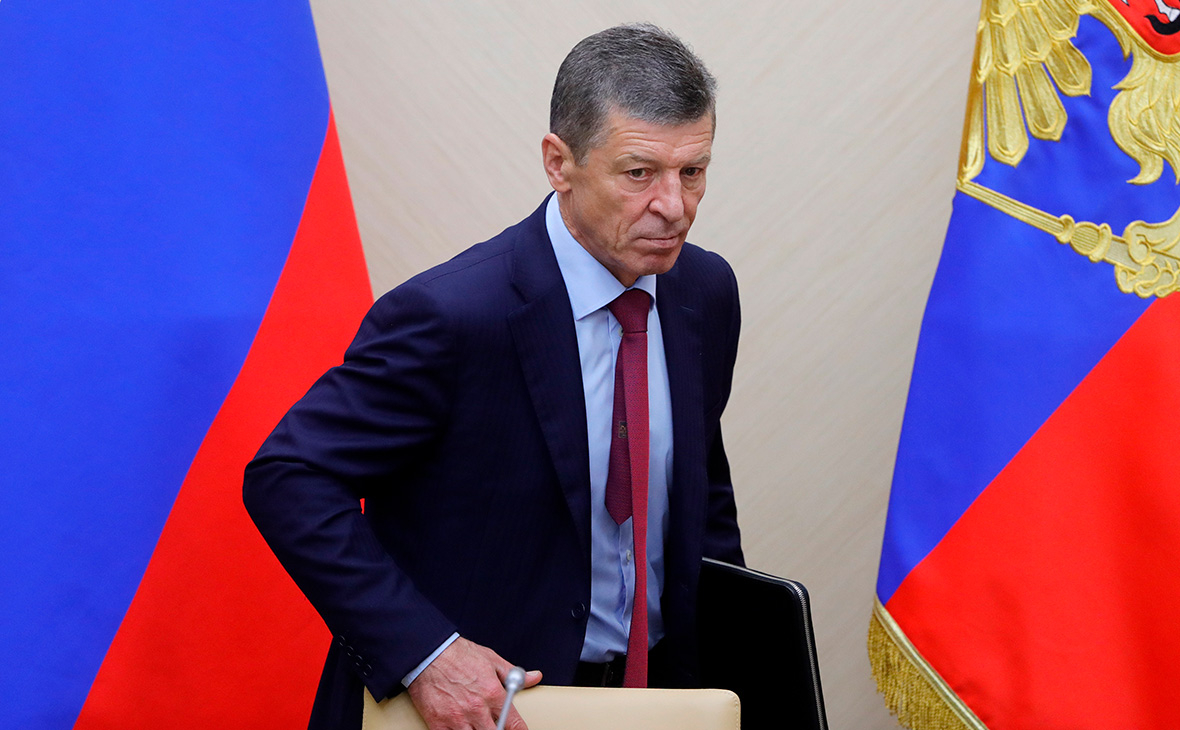Moreover, a deadly flare-up occurred in February shortly after Kozak’s inherited hands-on control of what Surkov referred to in his hacked internal correspondence as T1 and T2 and what was branded by propaganda as “self-proclaimed people’s republics” – the occupied territories of Ukrainian Donetsk and Luhansk oblasts. And even more deadly attacks on Ukrainian troops occurred in recent days in the area.
Meanwhile, Ukrainian President Zelenskyy and his office continue making little of the hostilities and casualties in the Donbas, and push on the agenda to stop the conflict. The new head of Zelenskyy’s office even hopes for local elections under Ukrainian laws in the occupied territories later this year.
Rumors about Surkov’s resignation surfaced several times on Russian media in the last few years, although they have never been proved. Eventually, on 25 January Alexei Chesnakov, director of the pro-Kremlin “Center for Current Policy” and Surkov’s assistant, wrote that Surkov was resigning,
“In connection with the change of the course at the Ukrainian direction, Vladislav Surkov resigned from the civil service. Within the next month, he is going to meditate. After that, he promises to provide reasons for his decision and future plans,” the message reads on Chesnakov’s Twitter.
On the previous day former Russian vice-prime-minister Dmitry Kozak, who was dismissed in mid-January, got appointed as deputy chief of Putin’s administration. Later on 11 February, the Kremlin’s press secretary Dmitry Peskov approved that Kozak was going to oversee Putin’s policies towards Ukraine,
“In his new role, Kozak is in charge and will continue to be in charge of Ukrainian issues.”
On 18 February Putin’s decree published on the Russian presidential website formalized the dismissal of Surkov.
Kremlin’s “gray cardinal”

Vladislav Surkov served in the Russian presidential administration starting from 1999, entered the Russian Cabinet in 2011, and later became a personal advisor to Putin in fall 2013. Initially, aide Surkov oversaw the occupied territories of Georgia as a handler for two breakaway regions of Abkhazia and South Ossetia.
Soon Surkov became the Kremlin’s de-facto handler of Ukrainian policies. Amid the Euromaidan Revolution, Surkov visited Kyiv in January 2014 where he met with then-president Viktor Yanukovych, then Surkov traveled to Crimea, and in February 2014 he visited oligarch Rinat Akhmetov in Donetsk.
Due to his further involvement in the Russian occupation of Crimea in 2014, Vladislav Surkov was among the first Russian officials sanctioned by the US and four days later by the EU.
Later not only he became the mastermind behind Russian subversive and terrorist activities in the Ukrainian territory, but Surkov also designed the fake statelets of the Luhansk and Donetsk “people’s republics” (“LNR” and “DNR”) out of occupied swathes of Ukraine’s two respective oblasts, He was behind the development of their feigned political system with fake parties, power structures, “state policies,” and he continuously controlled hands-on the day-to-day minutiae of the statelets to make them look like kind of real state-like sovereign entities internationally.
Read also: The Surkov Leaks: Major report on Russia’s hybrid war in Ukraine published at RUSI institute
The Russian online newspaper Meduza interviewed several unnamed sources close to Surkov in the wake of his resignation. One source stated that starting from January 2018 Surkov and his team suspended most of their Ukraine-related activities such as working with leaders of public opinion and elites in Ukraine, forming an ideology, attempting to federalize and destabilize Ukraine, “protecting” Russian language, dealing with church issues. And, according to Meduza’s source, Surkov’s work completely stopped after Zelenskyy became the president.
Even if Surkov actually disengaged himself from undermining Ukraine in early 2018, the Russian government didn’t:
Ukraine-related narratives remained dominant in the diverse flow of Russian propaganda in 2018 and in 2019, Russia attempted to obstruct the recognition of the Ukrainian independent church internationally and shape public opinion in Ukraine against the new church, while pro-Russian politicians from Ukraine visited Putin on several occasions amid their electoral campaigns.
Kremlin’s “governor-general” for Donbas

Dmitry Kozak is Putin’s veteran bureaucrat who used to work in the same team with Putin for Saint Petersburg mayor Anatoly Sobchak in the 1990s. Later in August 1999, Kozak joined Prime Minister Putin’s Cabinet at a minor role and in a few years under President Putin, he moved up the career ladder to various ministerial posts to later become deputy head of the cabinet in October 2008.
Kozak oversaw the first re-election campaign of Putin in 2004, was in charge of organizing the 2014 Winter Olympics in Sochi, and was the Kremlin’s official responsible for relations with Moldova. After the Russian invasion and annexation of Crimea, he became the Russian government’s handler for the issues related to “Russia’s new federative units, the Republic of Crimea and Sevastopol,” which landed him on the US and EU Crimea-related sanction lists by in late April 2014.
As the vice-prime minister in the Russian Cabinet, Dmitry Kozak also headed a special inter-ministerial commission for the Donbas. While Surkov was in charge of the politics in the occupied Donbas, Kozak’s commission operated as the region’s “shadow government” handling the economic and humanitarian issues.
In 2019 Dmitry Kozak was involved in preparing the prisoner exchange between Russia and Ukraine that succeeded in September. His Ukrainian counterpart was Zelenskyy’s aide Andriy Yermak
Both Surkov and Kozak remain on the sanction lists as of now.
With Kozak’s appointment in Russia, Zelenskyy replaces chief of his office

On 11 February when Putin’s press secretary confirmed that Kozak would be in charge in the Kremlin “when it comes to Ukraine”, Ukrainian President Volodymyr Zelenskyy replaced Andriy Bohdan, the chief of his office, with presidential aide Andriy Yermak, who previously negotiated the prisoner swap with Russia.
Read also: Fears of a pro-Russian turn as Yermak appointed new head of Ukrainian President’s Office
At a political TV show, Yermak said that he had met with Kozak and believes that he was “the best option after Surkov.”
“Just two hours after the announcement that Yermak headed [Zelenskyy’s] administration, Russia’s Peskov said for the first time ever that Kozak oversees the Ukrainian affairs in the Kremlin, although this issue was previously ignored,” commented Serhiy Harmash, head of the Center for Donbas Social Prospects Research.
Yermak believes that Ukraine can negotiate and come to an agreement with Russia to hold the local elections in the occupied Donbas,
“I hope that Ukraine will come to this meeting with a new package of accords and that we will take the next steps in order to hold local elections under Ukrainian law across the entire territory of Ukraine in late October,” said Yermak in an interview published in early February.
Under the entire territory, Yermak probably implied all of Ukraine including the occupied parts of Donetsk and Luhansk oblasts, but not Crimea since he didn’t mention any plans to hold elections in the occupied peninsula.
“The issue of Crimea is even more complicated [than the one of the Donbas]. But we are also working on it. I can’t tell more so far,” said the official in an interview with Interfax-Ukraine, published on 11 February and replied to the question on rumored elections in the occupied territories in October, saying,
“Local elections are one of the little keys to the unity of the country. The local elections taking place simultaneously throughout Ukraine unite the country… This is a very important symbol for me. Politically, it would be even more advantageous for us if the local elections could be held earlier there. This would mean that the war has ended earlier. After all, elections in the Donbas are possible only after the hostilities ended there and foreign [Russian – Ed.] armed groups withdrew… Somehow, I believe that it is possible, for some reason I’ve got such a feeling,” told Yermak.
Meanwhile, asked why in his opinion the comprehensive ceasefire has been failing in the Donbas, Yermak said,
“Unfortunately, I can’t tell you all the truth, replying to this question. I’m sure that we will achieve peace, really sure.”
Yermak’s words show that the idea to hold the elections in the occupied Donbas has been fetishized in the presidential office not less than the idea of “stopping” the war that has been among Zelenskyy’s campaign promises. And the idea of holding the Donbas elections might have been the common point with Russia which restarted the negotiation process in the Normandy Format that was previously stalled for years.
Read also: Portnikov: Next Normandy Four summit won’t be soon
While official Ukraine has been ready to withdraw troops, stop the war and negotiate the Ukrainian elections in the territory it doesn’t control, Russia doesn’t even try to suspend hostilities in the Donbas.
As a result of Russian attacks, Ukrainian forces suffered 14 fatalities and got 58 soldiers wounded in action in January and February after the “total ceasefire” was agreed upon by Zelenskyy and Putin in Paris in December 2019. Two soldiers were killed and 15 wounded in the second half of February after it was confirmed that Kozak took over Surkov’s responsibilities.
Trench warfare continues in the east of Ukraine and the Joint-Forces Operation HQ reports attacks on Ukrainian positions every day.
- On 3 March, one Ukrainian soldier was killed and 5 more wounded in action.
- Four servicemen were wounded in action on 4 March, and three more on 5 March.
- On 6 March a Ukrainian infantry vehicle BMP hit an unidentified explosive device (allegedly an anti-tank mine), one soldier died in the incident, three more were injured. One more serviceman was wounded in action on that day.
- On 7 March a civilian was wounded in the Ukraine-controlled town of Marinka, by a sniper shot.
- On 8 March the Russian hybrid forces hit a military truck with a rocket, killing one and wounding three Ukrainian soldiers, three more were wounded amid the fire-attacks on Ukrainian positions.
- On 9 March one Ukrainian soldier was wounded in hostilities, and a military ambulance was attacked by a UAV capable of dropping the VOG grenades.
- On 10 March the Russian-hybrid forces hit a Ukrainian military truck near the village of Pisky with an anti-tank missile, killing two soldiers and wounding eight more. One more soldier was killed and another wounded in action on that day.
- On 11 March one more soldier was wounded, and residential neighborhoods of Marinka came under fire.
Read also: Ukraine suffers casualties in military escalation near disengagement zone in Luhansk Oblast
Meanwhile, on 1 March Andriy Yermak met with Dmitry Kozak in the Belarusian capital to discuss the next round of the prisoner exchange earlier agreed at the Normandy Four meeting in Paris last December.
“The participants of the meeting stressed the need to continue negotiations in order to fully implement the agreements, reached at the Normandy format summit,” the post on the official Telegram channel of Zelenskyy’s office reads.
Another meeting of Yermak and Kozak took place in Minsk on 11 March. The negotiators have reportedly agreed upon the approval of a new prisoner exchange list, and the opening of entry-exit checkpoints in the towns of Zolote and Shchastia, Luhansk oblast.
Read also:
- Ukraine suffers casualties in military escalation near disengagement zone in Luhansk Oblast
- Ukraine’s water blockade of Crimea should stay, because it’s working
- Portnikov: Next Normandy Four summit won’t be soon
- Zelenskyy’s first Normandy and the illusion of progress
- Ukrainian and Russian positions at Normandy Four talks in Paris
- What Surkov’s hacked emails tell about Russia’s hybrid war against Ukraine
- The Surkov Leaks: Major report on Russia’s hybrid war in Ukraine published at RUSI institute
- Minsk-2 is the real problem for Ukraine, not “Steinmeier’s formula” | Infographics
- Ukraine pulls out troops from town in Luhansk Oblast despite military activity
- Leaked Kremlin emails show Minsk protocol designed as path to Ukraine’s capitulation
- Who is who in the Kremlin proxy “Luhansk People’s Republic”
- Who is who in the Kremlin proxy “Donetsk People’s Republic”






